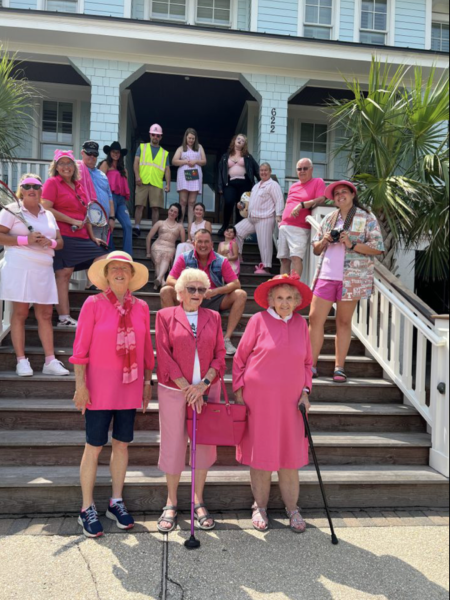Pink. A lot of pink. And sparkles and glitters and some tears. That about sums up my experience going to see Barbie this summer. I watched the movie with almost all of the women in my family, from my grandmother to my aunts and sister. There were four generations of women in that room with me. My cousin who was the original owner of all my sister’s and my dolls and movie hand-me-downs. My grandma who has to have watched over the various DVDs we had as kids over two hundred times. I watched that movie with my mother in mind, who when hired was the only woman in her surgery department. She would’ve loved the Barbie movie. I saw the movie with her best friend of over twenty-five years.
The first time I met Barbie would’ve been on my grandmother’s floor sometime in preschool. She has a collection of the blondes DVDs that are as numerous as I could count at that age. A Barbie movie for every day of the month, each complete with a peanut butter and jelly sandwich or Bagel Bites for our daily summer lunch movies as kids. Barbie taught me a lot of life lessons as I grew up. I was a kid who loved reading but who also loved to play pretend with her mother’s makeup. I loved dresses and high heels and school. I loved Barbie. My favorite color was, and still is, pink.
There is a tendency of young girls to reject all the pink that seems forced onto them when they were little. Sometime around the age of ten it seemed it was no longer cool to like pink. Everyone had moved onto new colors like black or blue. Sure, many of those girls simply like other colors. But many of them also feel like they shouldn’t. Like it’s lame to be “girly” and like the color pink. That you should hate Taylor Swift and Barbie dolls. It’s the first example in many girls of their own internalized misogyny—to reject the things associated with girlhood because those things are bad. Just like Sasha, young girls move on. It becomes uncool to like pink and be feminine. Sometimes it feels like it’s a necessity to be a feminist and hate everything associated with young girls.
The new movie itself hits you over the head with its messaging. Barbie is not just about looking pretty; Barbie is not perfect; being a woman is not easy. America Ferrera’s monologue at the end of the movie seems like overkill by the time she’s done reciting all the expectations shoved down women’s throats. When she proudly proclaims that, “It is literally impossible to be a woman,” the audience understands that this is going to be a dramatic and overemphasized monologue. As Ferrera’s character devolves into all the standards and pressures, it’s obvious the monologue is meant to be a slap in your face of blatant information. It may seem redundant to many women. It may be a lot to take in for a lot of others; it may be aggressive in its messaging, but it’s sadly all true. The movie may lack the nuance some of us hoped to see come out of it. But the Barbie movie was not made for intersectional feminism and the continued fight for abortion rights. At the end of the day, the Barbie movie was about being a woman. It was about a shared experience. It showed you that not even Barbie and make pretend land was perfect.
The Barbie movie is about pink and glitter. The Barbie movie is about living under patriarchy and misogyny. But there is also another level to Barbie—shared girlhood. Sometimes a woman in her 40s needs Barbie more than her teenage daughter. There is a connection between the women in that theater all seeing it together. For most of us, dolls are a common element of our childhoods. And for all of us, our dreams were to do something big and bright and meaningful to us. There is a Barbie in Barbie-land living out all of our dreams for us.
The Barbie movie wasn’t perfect, but it made people laugh, and it made a lot of people cry. It lets you know that Barbie was made for every single woman in that theater to dream big. At the end of the day, I’m grateful to have grown up in a world where I got to watch Barbie movies on the floor and think of all the different things I could be when I grew up. And I’m even more grateful for the women in my life who were my real Barbies, my grandma and my mom, who were the ones who showed me my big dreams could come true. Maybe they even have glitter on them.



